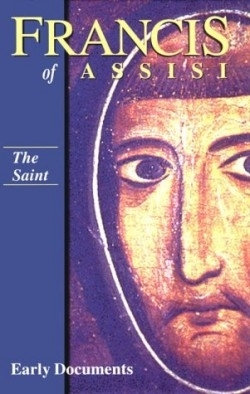The Saint
Francis of Assisi - Early Documents
What is the definition of a great man today? It is quite possible that it hasn’t changed from the thirteenth century when St. Francis forfeited his wealth and power for something divine. He endured verbal and physical opposition from even his friends and family after he was struck by a vision of purpose from God. He became, in the words of Pope Gregory IX, “a militant agent or legate of Christ sent to crush the seven-headed dragon and to convert the people.” St. Francis of Assisi converted and inspired many people, both in life and after death.
The Saint contains St. Francis’ writings as well as accounts of his life by authors Thomas of Celano, Julian of Speyer and Henri d’Avranches. Each offers a slightly different yet and important emphasis, concentrating on his life and miraculous deeds after his revelation. The idea is plain in each: St. Francis devoted his life to God in complete humility, poverty and service to mankind. This is most beautifully shown, however, in the writings of St.Francis himself. An educated man, his text often was gramatically incorrect and misspelled, but he was a man of unusual discernment and knowledge. This knowledge he diligently shared with overwhelming faith. Many of his writings end with an urging of the reader to pass them along accurately and truthfully. Perhaps the most astounding charecteristic of this man’s work is precisely its simplicity. His method of writing—and that of the three authors—is appropriate to his message of complete reverence for, and servility to, God.
The compilation of writings on the life of St. Francis is important because it provides an enlivening understanding of the events that brought forth these words. Without these descriptions, one would know little of his life because St. Francis understood that greatness belongs only to God and servitude comes not from man’s selfish need to be great, but from necessity of duty. It is possible that St. Francis would not at all approve of a review of his life, but would want an account of his message, that
of the Creator. This collection of writings, both about and by St. Francis of Assisi, is a testament to a faith that inspired a simple sincerity of word.
Reviewed by
Mary Beth Zeleznik
Disclosure: This article is not an endorsement, but a review. The publisher of this book provided free copies of the book to have their book reviewed by a professional reviewer. No fee was paid by the publisher for this review. Foreword Reviews only recommends books that we love. Foreword Magazine, Inc. is disclosing this in accordance with the Federal Trade Commission’s 16 CFR, Part 255.

